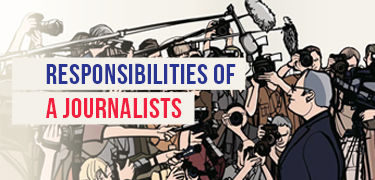Responsibilities of a Journalists
Journalists serve as the eyes and ears of any newspaper or new channel. It is difficult to classify all of a correspondent's attributes correctly. Correspondents must, nevertheless, be capable of doing any work entrusted to them with confidence, courage, and patience. For example, if you are assigned to cover the operations of a government department responsible for resolving public concerns, you must be intimately familiar with the subject matter. You should have a specific talent for producing sources. You should be willing to embrace the challenges of working in an unusual environment.
As a reporter, you must be able to get information from any source. You should be a clear and concise speaker. You should have limitless patience. You should be able to function successfully in a variety of challenging environments. To effectively do your work and emerge as a competitive reporter, you must be able to examine and evaluate various scenarios and predict the future course of events. Furthermore, you should be able to manage news by the event.


Qualities and Duties of a Journalist
When writing news, a competent reporter should be aware of her or his responsibilities to society, the organization for which he or she works, and humankind as a whole. When using a camera or pen, use caution. Journalists are neither social workers, social reformers, or preachers. Correspondents aim to draw public notice to societal oddities. As a result, a journalist's curiosity and attention to detail are critical. Her/his health should be perfect, and she/he should be able to efficiently complete even the most demanding duties of a journalist. Above all, a reporter should be a social animal who frequently contacts the public.
Qualities Necessary For a Journalist
Capability to Smell Good News
The essential quality/role of a journalist is the ability to anticipate and inform the public about ever-changing societal equations. To smell news, you must be able to predict whether a particular piece of information or incident has news value or is being concealed. This skill can be learned after some time; it must be developed over time.
Extroverted and Sociable Nature
A professional journalist cannot be an introverted writer, and a reclusive individual cannot become a competent journalist. Journalists must meet with many people regularly, gain their trust, and develop sources. Today's investigative journalism requires extroverted journalists to gather behind-the-scenes information.
Capability to remain a Neutral Analyst
Correspondents observe and assess events objectively, presenting them to readers or audiences. When reporting, a reporter intentionally avoids the cardinal sins of omission and commission. Journalists may have personal opinions on events but are not permitted to use them in their coverage. News can attain objectivity and balance only when data and facts are obtained and compiled objectively, and the viewer can conclude.
Ability to present thoughts clearly
As a reporter, one must work on various subjects, including science, technology, and economics. You should have a firm grasp of a variety of disciplines. A reporter must thoroughly understand a wide range of topics to convey the most complicated of matters to the general public in the simplest way possible so that even a layperson may grasp them. Reporters must simplify complicated technical phrases in specialized news items (e.g., science, technology, and economics) to ensure universal understanding.
Capability to form ‘contacts’ or ‘sources’ and maintain them
It is critical to regularly assess the reliability of 'contacts' or 'information sources' while simultaneously keeping your credibility in front of your contacts. As journalists spend more time in their journalism careers, their experience grows, as does the quantity and scope of their connections. These contacts are exclusive to them. They follow them no matter where they work, whether for a news station or newspaper. Contacts must be formed over time and with patience.
To be able to perform under various internal and external pressures
Individuals may use bribery or intimidation to prevent reporters from publishing or airing news detrimental to their interests. Additionally, government officials and publicists exert pressure on the media. Pressure to conceal news may come from newspaper management, the government, or political parties. If publishing a report might harm an individual or organization's prospects, they may use legal or illegal tactics to pressure you. Threats and violence may scare and demoralize individuals.
There are three techniques to counter pressure:
1. Handle the pressure.
2. Modify your tale to meet the pressure group's criteria.
3. Evaluate the pressure and respond accordingly.
The first approach to countering pressure is the most reputable. In both global and Indian media, people have been compromising the quality of their publications by limiting their circulation. During the 1975 'Emergency Rule,' newspapers such as 'Mainstream' chose to close rather than succumb to government coercion.
Journalists always need to be ready to face any situation like late night coverage, odd working hours and also ready to compromise on their personal lives.


CATEGORIES
- MBA Program
- Data Science and Analytics
- Cloud Computing
- Data Analytics and Business Intelligence
- AI and Digital Systems
- Cyber Security and Digital Forensics
- Business Analytics & Intelligence
- Banking & Financial Services
- International Business
- Digital Marketing
- Research Paper
- Media & Entertainment
- Media Management
- Journalism and Media Production
- Media & Information Technology
- Visual Communication
- Game Development
- Sound Engineering
- Game Art & Design
- Photography
- Film Making
- Animation & VFX
Are you aspiring to become a proficient Journalism and Media Production professional?
Look no further; we are committed to nurturing the potential of young minds. Are you ready to enhance your skills?


